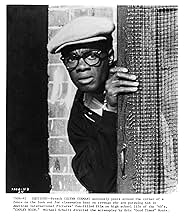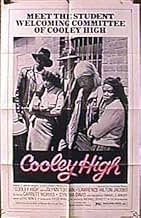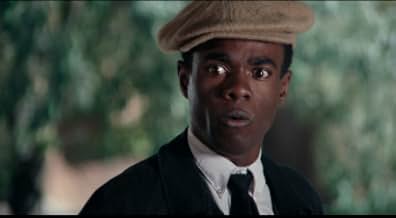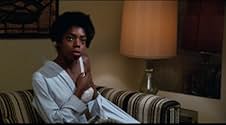AVALIAÇÃO DA IMDb
7,1/10
5,9 mil
SUA AVALIAÇÃO
Adicionar um enredo no seu idiomaIn 1964 on Chicago's Near-North Side, the lives of four carefree high school seniors and best friends, including an aspiring playwright and an all-city basketball champion, takes a tragic tu... Ler tudoIn 1964 on Chicago's Near-North Side, the lives of four carefree high school seniors and best friends, including an aspiring playwright and an all-city basketball champion, takes a tragic turn.In 1964 on Chicago's Near-North Side, the lives of four carefree high school seniors and best friends, including an aspiring playwright and an all-city basketball champion, takes a tragic turn.
- Prêmios
- 1 vitória no total
Avaliações em destaque
While this seems to be a black equivalent to "American Graffitti", I would hardly call this "Blaxploitation". Really not in the same boat as "Sweet Sweetbacks Badass Song", all those Pam Grier movies by Jack Hill, and the usual sort. Interesting to see Lawrence Hilton Jacobs in something other than "Welcome Back Kotter", or his low-rent action films. Interesting to note that "Kotter" comes up in a few posts, but I didn't see anyone mention that the TV show "What's Happening" (and the later, "What's Happening Now" I suppose), was based on, and inspired by this film, which is why I wanted to see it in the first place. This film is vastly superior to "What's Happening" (for many reasons, most obviously, the lack of the "Rerun" character), and has real heart. Also, it features some excellent use of Godzilla footage in the theatre scenes, something I always appreciate. If you haven't seen it, you really should.
This movie seems to always be compared to "American Graffiti" and, given that both end in a similar "Where are they now?" montage, feature a high level of period pop music and are generally show teenagers running around, having fun and encountering mishaps, it's fair to say that to some extent the film was intended as a black "American Graffiti". "American Graffiti" was an iconic and hugely popular phenomenon, and given that the title has 'American' in it but it essentially a story of only the white American experience, once can see how blacks might have desired a movie that could capture their own experiences during those magic moments as youth comes to an end.
"Cooley High" is also something of an answer to its white counterpart, though: simply by showing a typical black teenager experience in 1962 it is going to have to make some kind of social commentary. In "American Graffiti" the high crimes are drag racing and minors buying booze, while we see decidedly rougher characters in "Cooley High". The only two who stand out as three-dimensional are the leads, Cochise and Preach, but they have more depth than any of the characters in "Graffiti". Unfortunately, the other characters in the movie fall flat and you'll be very lucky if, after your first viewing, you remember the names of even half of them before they flash on the screen in the final sequence.
Cochise is the smart and college-bound student whose best friend Preach, despite being no less intelligent, seems to be destined to fail. Much of the movie is devoted to their high-spirited teenage adventures, in the spirit of "Graffiti", and the movie is entertaining enough as the gang skips school to go the zoo, crashes a party, inadvertently starts a brawl in a movie theater, and so on. Things pick up, though, and the final minutes of the film how the consequences of their fun in the first hour.
This movie is interesting and I'm glad it was made as a black counterpoint to "American Graffiti". However, the characters aren't quite as memorable in "Coolie High", and the stories just aren't as clever and fun either. This isn't to say "Coolie High" fails, it's just that "American Graffiti" had some pretty brilliant stories which it would be hard for any movie to equal. One exception is the romantic scene between Preach and Brenda which, although comic in nature, utterly transcends any racial boundaries and is a wonderfully honest depiction of the inherent awkwardness of the situation, something the audience can relate to far more honestly than the typical confident and lustful love scenes we usually see in movies.
The movie is uneven and, to this reviewer, can't quite reach the highs of the movie it is providing a counterpoint to. Still, I can very much relate to "American Graffiti" but what do I know about growing up in Cabrini Green? Some viewers might love this far more than "American Graffiti". This movie seems pretty forgotten, but it shouldn't be.
"Cooley High" is also something of an answer to its white counterpart, though: simply by showing a typical black teenager experience in 1962 it is going to have to make some kind of social commentary. In "American Graffiti" the high crimes are drag racing and minors buying booze, while we see decidedly rougher characters in "Cooley High". The only two who stand out as three-dimensional are the leads, Cochise and Preach, but they have more depth than any of the characters in "Graffiti". Unfortunately, the other characters in the movie fall flat and you'll be very lucky if, after your first viewing, you remember the names of even half of them before they flash on the screen in the final sequence.
Cochise is the smart and college-bound student whose best friend Preach, despite being no less intelligent, seems to be destined to fail. Much of the movie is devoted to their high-spirited teenage adventures, in the spirit of "Graffiti", and the movie is entertaining enough as the gang skips school to go the zoo, crashes a party, inadvertently starts a brawl in a movie theater, and so on. Things pick up, though, and the final minutes of the film how the consequences of their fun in the first hour.
This movie is interesting and I'm glad it was made as a black counterpoint to "American Graffiti". However, the characters aren't quite as memorable in "Coolie High", and the stories just aren't as clever and fun either. This isn't to say "Coolie High" fails, it's just that "American Graffiti" had some pretty brilliant stories which it would be hard for any movie to equal. One exception is the romantic scene between Preach and Brenda which, although comic in nature, utterly transcends any racial boundaries and is a wonderfully honest depiction of the inherent awkwardness of the situation, something the audience can relate to far more honestly than the typical confident and lustful love scenes we usually see in movies.
The movie is uneven and, to this reviewer, can't quite reach the highs of the movie it is providing a counterpoint to. Still, I can very much relate to "American Graffiti" but what do I know about growing up in Cabrini Green? Some viewers might love this far more than "American Graffiti". This movie seems pretty forgotten, but it shouldn't be.
...instead, watch it as a great coming of age tale about African American males in the mid 1960's in the ghettos of Chicago. For all of you out there under the age of 50, "What's Happening" was a light-hearted rather quirky sitcom with very few serious moments that lasted four years (1975-1979) concerning a group of young African American high school kids living in a working class neighborhood. I liked it a great deal - it just has no real connection to this film. "Cooley High" started out as being the basis for "What's Happening", but its serious nature did not register well with test audiences, so it was redone as a comedy, even though the credits on "What's Happening" still read that it was based on this movie.
This film starts out light, but touches many aspects of life unique to the turbulent 1960's and also some other aspects of growing up that are timeless. The guys deal with sex, betrayal, joblessness, hopelessness, and even early death. The ending is quite powerful and serious, and the film has a great Motown soundtrack. Highly recommended. Unfortunately, this film is not new enough to be played on premium cable channels and not considered old enough to be considered a classic movie and played in the few venues for those films either.
This film starts out light, but touches many aspects of life unique to the turbulent 1960's and also some other aspects of growing up that are timeless. The guys deal with sex, betrayal, joblessness, hopelessness, and even early death. The ending is quite powerful and serious, and the film has a great Motown soundtrack. Highly recommended. Unfortunately, this film is not new enough to be played on premium cable channels and not considered old enough to be considered a classic movie and played in the few venues for those films either.
This this coming of age dramedy set in Chicago in the early 60's, we follow a group of highschool friends as they navigate through the ups and downs of their lives. The two central characters are Leroy "Preach" Jackson (Turman) and his best friend Richard "Cochise" Morris (Hilton-Jacobs.) Both of these boys have promising futures. Preach is a great writer but a lazy student, and Cochise has just received a college scholarship for basketball. When they're not hanging out at the local diner shooting craps with their friends, or hanging out at a friends house or chasing girls, they're skipping school, riding the trains through Chicago or going to quarter parties on the weekends.
Things go wrong when Preach and Cochise make the mistake of getting involved with two hoods and go joyriding in a stolen car. The police pursue them and they are arrested. But thanks to the efforts of a concerned teacher (SNL's Garrett Morris) they are released. But the two hoods are not, and vow to get revenge on Preach and Cochise, thinking they blamed the whole thing on them.
This movie is very episodic, but it still works because thats what life is, a series of episodes. Some funny, some sad, some romantic, some bizarre. The film never gets boring because all the characters are so well played and realistic, and the situations are all believable and relatable. Like Preach romantically pursuing a beautiful girl, or a party turning violent when some asshole decides to start a fight, or dealing with a bratty younger sibling. But even when a situation isn't personally relatable, like the guys pretending to be undercover cops to con a hooker out of some money so they could get all their friends into a movie, the sequence is still hilarious.
'Cooley High' was the basis for the classic 70's sitcom 'What's Happenin!' which aired on ABC from 1976-1979. Even though the show is most famous for the character Rerun, he is not in this film, nor is there any character remotely like him. The humor of that show was very broad, but still funny. The humor of 'Cooley High' is truer to life, and thus more entertaining.
Additionally, the soundtrack is wonderful. Classic songs from that period by Diana Ross & The Supremes, The Temptations, Martha & the Vandellas, and Smokey Robinson play throughout the film, adding to the fun, youthful, exuberant tone of the film.
Things go wrong when Preach and Cochise make the mistake of getting involved with two hoods and go joyriding in a stolen car. The police pursue them and they are arrested. But thanks to the efforts of a concerned teacher (SNL's Garrett Morris) they are released. But the two hoods are not, and vow to get revenge on Preach and Cochise, thinking they blamed the whole thing on them.
This movie is very episodic, but it still works because thats what life is, a series of episodes. Some funny, some sad, some romantic, some bizarre. The film never gets boring because all the characters are so well played and realistic, and the situations are all believable and relatable. Like Preach romantically pursuing a beautiful girl, or a party turning violent when some asshole decides to start a fight, or dealing with a bratty younger sibling. But even when a situation isn't personally relatable, like the guys pretending to be undercover cops to con a hooker out of some money so they could get all their friends into a movie, the sequence is still hilarious.
'Cooley High' was the basis for the classic 70's sitcom 'What's Happenin!' which aired on ABC from 1976-1979. Even though the show is most famous for the character Rerun, he is not in this film, nor is there any character remotely like him. The humor of that show was very broad, but still funny. The humor of 'Cooley High' is truer to life, and thus more entertaining.
Additionally, the soundtrack is wonderful. Classic songs from that period by Diana Ross & The Supremes, The Temptations, Martha & the Vandellas, and Smokey Robinson play throughout the film, adding to the fun, youthful, exuberant tone of the film.
Now, I am not prone to much emotion, but I cried seeing this movie. It certainly has more appeal among blacks than other ethnic groups, but there is something here for everyone. The classic song "It's so Hard to Say Goodbye" really makes this one worth watching at least once.
Você sabia?
- CuriosidadesAccording to Garrett Morris, the producers did not want to cast him in the role of Mr. Mason because they felt that he looked too young. Morris was a real-life schoolteacher at the time. Director Michael Schultz insisted that Morris was right for the role.
- Erros de gravaçãoMany automobiles from the 1970s are seen in many places.
- Cenas durante ou pós-créditosThe ending of the movie tells the futures of the fictional characters.
- Trilhas sonorasIt's so hard to say goodbye to yesterday
Performed by G.C. Cameron
Music by Freddie Perren
Lyrics by Christine Yarian
Principais escolhas
Faça login para avaliar e ver a lista de recomendações personalizadas
- How long is Cooley High?Fornecido pela Alexa
Detalhes
- Data de lançamento
- País de origem
- Idioma
- Também conhecido como
- Училище Кулі
- Locações de filme
- Empresas de produção
- Consulte mais créditos da empresa na IMDbPro
Bilheteria
- Orçamento
- US$ 750.000 (estimativa)
Contribua para esta página
Sugerir uma alteração ou adicionar conteúdo ausente

Principal brecha
By what name was Cooley High (1975) officially released in India in English?
Responda

























